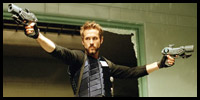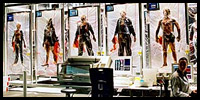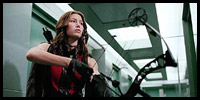
 |
|
Blade: Trinity (2004) Cast: Wesley Snipe, Jessica Biel, Ryan Reynolds, Parker Posey, Dominic Purcell, Kris Kristofferson, Natasha Lyonne, Callum Keith Rennie, Eric Bogosian, Haili Page, James Remar, Patton Oswalt, Paul Michael Levesque (aka Triple-H), Paul Anthony, John Ashker, Scott Heindl, Steve Braun, Mark Berry 2004 – 106 minutes Rated: Reviewed by Dustin Putman, December 3, 2004.  The third and allegedly final chapter in the Marvel comic-adapted series, "Blade: Trinity" corrects none of the mistakes made in 2002's instantly forgettable "Blade II," all the while leaving the fond memory made by 1998's superior original in the dust. Written and directed by David S. Goyer (screenwriter, also, of the previous two), this tepid horror-actioner is unscary and only sporadically diverting, wasting millions of dollars on a glossy sheen, MTV-inspired quick edits, and a derivative chain of events that, by this point, are prosaic.
The third and allegedly final chapter in the Marvel comic-adapted series, "Blade: Trinity" corrects none of the mistakes made in 2002's instantly forgettable "Blade II," all the while leaving the fond memory made by 1998's superior original in the dust. Written and directed by David S. Goyer (screenwriter, also, of the previous two), this tepid horror-actioner is unscary and only sporadically diverting, wasting millions of dollars on a glossy sheen, MTV-inspired quick edits, and a derivative chain of events that, by this point, are prosaic.
 When a clan of vampires, headed by sniveling ball-buster Danica Talos (Parker Posey), unleash the long-festering Dracula (Dominic Purcell) from his grave in an Iraqi tomb, the world is instantly threatened with an untimely apocalypse. To distract half-vampire/half-human creature hunter Blade (Wesley Snipes) from their plan, they fool him into killing a human and getting arrested. What the vampires don't count on is a jail breakout, orchestrated by Whistler's (Kris Kristofferson) vampire-kicking daughter, Abigail (Jessica Biel), and her partner, former bloodsucker Hannibal King (Ryan Reynolds). Now the fight is on, with Blade, Abigail, and Hannibal King making up the title 'trinity' and, this time, with a contained virus in hand powerful enough to rid the world of the fanged population. Because vampire blood still runs through Blade, however, he may end up sacrificing himself in the process.
When a clan of vampires, headed by sniveling ball-buster Danica Talos (Parker Posey), unleash the long-festering Dracula (Dominic Purcell) from his grave in an Iraqi tomb, the world is instantly threatened with an untimely apocalypse. To distract half-vampire/half-human creature hunter Blade (Wesley Snipes) from their plan, they fool him into killing a human and getting arrested. What the vampires don't count on is a jail breakout, orchestrated by Whistler's (Kris Kristofferson) vampire-kicking daughter, Abigail (Jessica Biel), and her partner, former bloodsucker Hannibal King (Ryan Reynolds). Now the fight is on, with Blade, Abigail, and Hannibal King making up the title 'trinity' and, this time, with a contained virus in hand powerful enough to rid the world of the fanged population. Because vampire blood still runs through Blade, however, he may end up sacrificing himself in the process.
 As is too often the case with sequels, "Blade: Trinity" is an uninspired traipse through material that has been rehashed with only one-quarter of the stimulation the first film offered. By now, writer-director David S. Goyer has run out of fresh ideas and a new angle for which to use in telling his story, opting for a lot of situations that will cause deja vu for even the most casual viewers of action pictures. There is a lifelessness about "Blade: Trinity" that has nothing to do with the undead villains and all to do with a lack of invention. Even the action scenes—a high-octane car chase here, a three-way montage of good-vs.-bad fighting there—are more plentiful in rapid-fire cuts than bona fide excitement.
As is too often the case with sequels, "Blade: Trinity" is an uninspired traipse through material that has been rehashed with only one-quarter of the stimulation the first film offered. By now, writer-director David S. Goyer has run out of fresh ideas and a new angle for which to use in telling his story, opting for a lot of situations that will cause deja vu for even the most casual viewers of action pictures. There is a lifelessness about "Blade: Trinity" that has nothing to do with the undead villains and all to do with a lack of invention. Even the action scenes—a high-octane car chase here, a three-way montage of good-vs.-bad fighting there—are more plentiful in rapid-fire cuts than bona fide excitement.
 One of Goyer's most disastrous missteps is in forgetting to bring threat to the proceedings. When Blade and Abigail go against the vampires, they not only always win, but don't so much as receive a single blow. Unlike Sarah Michelle Gellar's tough-as-nails character in "Buffy the Vampire Slayer," who actually got scrapes and bruises and was, indeed, a mortal human being, there is no risk or danger involved in these protagonists' fates. The predictability of such does away with the overall menace of the bad guys, who, in few cases, ever get their way. When Dracula is finally allowed to successfully be a killer, the film momentarily jerks to life and actual horror is brought to the forefront. A deadly stop at a goth store concludes with a sleek, effective shot reminiscent of the hardcore vampire movies of yesteryear, while a scene in which the blind Sommerfield (Natasha Lyonne) becomes trapped in the midst of an evil she can sense, but not see, is the only moment that elicits real dread. Expertly set up, the camera swinging slowly around Sommerfield and about to pounce a dastardly surprise at any moment, if all of "Blade: Trinity" were as resourceful to genre conventions as this three-minute section Goyer might have had something special.
One of Goyer's most disastrous missteps is in forgetting to bring threat to the proceedings. When Blade and Abigail go against the vampires, they not only always win, but don't so much as receive a single blow. Unlike Sarah Michelle Gellar's tough-as-nails character in "Buffy the Vampire Slayer," who actually got scrapes and bruises and was, indeed, a mortal human being, there is no risk or danger involved in these protagonists' fates. The predictability of such does away with the overall menace of the bad guys, who, in few cases, ever get their way. When Dracula is finally allowed to successfully be a killer, the film momentarily jerks to life and actual horror is brought to the forefront. A deadly stop at a goth store concludes with a sleek, effective shot reminiscent of the hardcore vampire movies of yesteryear, while a scene in which the blind Sommerfield (Natasha Lyonne) becomes trapped in the midst of an evil she can sense, but not see, is the only moment that elicits real dread. Expertly set up, the camera swinging slowly around Sommerfield and about to pounce a dastardly surprise at any moment, if all of "Blade: Trinity" were as resourceful to genre conventions as this three-minute section Goyer might have had something special.
 Wesley Snipes, these days relying on the "Blade" franchise for much of his income, looks cool in leather and sunglasses, but is boring. He brings nothing new to the part of Blade—in fairness, the script does him no favors—and understandably doesn't have his heart in the project. Looking more happy to be there but no less vacant, a toned Jessica Biel (2003's "The Texas Chainsaw Massacre") and a buff Ryan Reynolds (2002's "National Lampoon's Van Wilder") enter the series for the first time with zeal. Biel and Reynolds look more than capable as skilled vampire hunters, but haven't any characters to emote through. They are blank slates, and any chance for depth is thrown out in favor of profane one-liners, usually courtesy of Reynolds, and several typical "getting-ready-to-fight" montages. Leading the forces of darkness are Dominic Purcell (2000's "Mission: Impossible 2"), a physically interesting, pumped-up version of what Dracula is usually portrayed as, and Parker Posey (2004's "Laws of Attraction"), repeating her humor-filled villainous role from 2001's "Josie and the Pussycats" with just a little more sexuality and edge.
Wesley Snipes, these days relying on the "Blade" franchise for much of his income, looks cool in leather and sunglasses, but is boring. He brings nothing new to the part of Blade—in fairness, the script does him no favors—and understandably doesn't have his heart in the project. Looking more happy to be there but no less vacant, a toned Jessica Biel (2003's "The Texas Chainsaw Massacre") and a buff Ryan Reynolds (2002's "National Lampoon's Van Wilder") enter the series for the first time with zeal. Biel and Reynolds look more than capable as skilled vampire hunters, but haven't any characters to emote through. They are blank slates, and any chance for depth is thrown out in favor of profane one-liners, usually courtesy of Reynolds, and several typical "getting-ready-to-fight" montages. Leading the forces of darkness are Dominic Purcell (2000's "Mission: Impossible 2"), a physically interesting, pumped-up version of what Dracula is usually portrayed as, and Parker Posey (2004's "Laws of Attraction"), repeating her humor-filled villainous role from 2001's "Josie and the Pussycats" with just a little more sexuality and edge.
 "Blade: Trinity" is harmless but shallow, cinematic junk food that goes down with ease but has no nutritional value and will be forgotten about almost immediately after devouring it. The picture is also curiously indifferent and not exactly an example of tightly woven plotting. To prove how sloppy "Blade: Trinity" is, a key character is kidnapped by the vampires near the end, and is one the catalysts for the climactic battle taking place. By the time the fighting subsides, this person in jeopardy has been forgotten about and is never mentioned again. The main players are given terrible send-offs, as well, with Abigail and Hannibal King badly missing character arcs, and Blade in virtually the same place he was at the beginning. There is a suspect immobility—a resistance to move forward—about "Blade: Trinity" that even the quick pacing cannot disguise. It is just as well. Blade and the world he resides in would have been best to end after he defeated the fabulously wicked Stephen Dorff in the 1998 precursor. Since then, he and the series have been treading on the red stuff.
"Blade: Trinity" is harmless but shallow, cinematic junk food that goes down with ease but has no nutritional value and will be forgotten about almost immediately after devouring it. The picture is also curiously indifferent and not exactly an example of tightly woven plotting. To prove how sloppy "Blade: Trinity" is, a key character is kidnapped by the vampires near the end, and is one the catalysts for the climactic battle taking place. By the time the fighting subsides, this person in jeopardy has been forgotten about and is never mentioned again. The main players are given terrible send-offs, as well, with Abigail and Hannibal King badly missing character arcs, and Blade in virtually the same place he was at the beginning. There is a suspect immobility—a resistance to move forward—about "Blade: Trinity" that even the quick pacing cannot disguise. It is just as well. Blade and the world he resides in would have been best to end after he defeated the fabulously wicked Stephen Dorff in the 1998 precursor. Since then, he and the series have been treading on the red stuff.
|
© 2004 by Dustin Putman |














